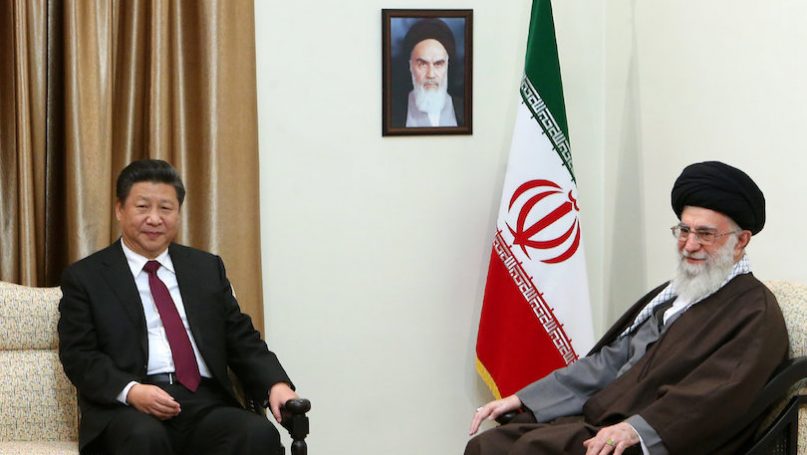Roie Yellinek

One of the major questions about the Sino-Iran 25 years agreement is: why now? And why do the Chinese need this agreement at all? This paper will answer this question. But first a brief about the agreement, the detailed revealed in an 18 pages proposed document obtained by The New York Times last July. It started with “Two ancient Asian cultures” ,and with these words the sides want to emphasize the long history of the relationship between them and by this to try blocking any future accusation that they do it only to undermine the US attempts to isolate Iran. In addition, this opening aims to send a Chinese message to the Iranian people that on top of sanctions, low oil prices, the worst COVID-19 outbreak in the Middle East, the accidental downing of a Ukrainian airliner, Beijing is standing alongside Tehran as “a traditional partner”. On the Iranian side, the Iranian people are exhausted and they just want to know that something good is going to happen at some point.
Rouhani government must show some achievements after more than seven years of office and the Sino-Iranian agreement might be a way for them to say to its people to just wait a little bit more because things will get better. And things in Iran may indeed be better, as the leaked information reveals that one of the terms of the agreement stipulates a Chinese investment of almost $ 400 billion in the oil, gas and petrochemical industries in Iran. Despite this, the deal is so controversial that even some of Iran’s politicians and government media have criticized it. For example, a headline in the newspaper Arman Melli claims that Iran is not Sri Lanka, while an article in the newspaper Hamdeli daily asked whether Iran will become a Chinese colony.
The agreement would vastly expand Chinese presence in banking, telecommunications, ports, railways and dozens of other projects in Iran. In exchange, China would receive a regular and heavily discounted supply of Iranian oil over the next 25 years. Furthermore, it will deepen the military cooperation, and even potentially giving China a foothold in a region that has been a strategic preoccupation of the US for the last decades, which holds a major naval basis there. It is not a new phenomenon and, for example, in December 2019 the two sides together with Russia conducted a four-day joint naval exercises in the Indian Ocean and the Gulf of Oman. And almost 10 years ago the Major General Zhang Zhaozhong commented that China will not hesitate to protect Iran even with a third world war.
It is hard to understand the timing because China is, after all, still trying to deal with the fallout of the coronavirus pandemic, which erupted in Wuhan. It is also engrossed in border battles with India and Russia. It is even harder to explain the timing by looking at the numbers. Beijing invests less than $27 billion in Iran from 2005 to 2019, with annually dropped every year since 2016. Last year China invested in Saudi Arabia 3 times more than in Iran, and marked Saudi Arabia as the main partner in the region.
Specifically in the Oil industry, what could be seen as the main motivation for the Chinese to sign an agreement is clashing with the numbers. China’s oil imports from Iran plummeted of 89% this March, when Beijing tried to secure a trade deal with the United States. In June, at least officially China imported no crude oil from Iran, compared to an all-time high from Saudi Arabia. In addition, all the major incidents in the Middle-East in recent years, which include Soleimani assassination, Iranian Abqaiq–Khurais attack and the ongoing war in Syria and Yemen, have not influenced the oil price for the long term. So again, why the Chinese need this agreement, and why now?
China did this mostly because it can and because it wants to continue to expand its sphere of influence, mainly in southeast Asia and also in the Middle East, which is the main source of oil and gas and an important spot for the Belt and Road initiative. By signing this deal, the Chinese send a clear message to the Saudi, the Emirates, the Iraqi, the Egyptian and the Israeli people that a new main actor is coming with all its power. If the agreement matures and goes into effect, the Chinese will build another navy basis in the Gulf with an eye open on the American one in Manama. This will make it very clear that the Chinese want to build a massive presence in the Middle East.
As a complementary angle to the deal, Iran is a “business in trouble”, and the Chinese often intervene to give help and leverage to their benefit without spending too much. Besides that, they will send a clear message to their neighboring countries, namely Japan, India, South Korea and more, that they are becoming dependent to China to have access to the oil and gas from the Middle East.
But above all of this the rivalry between the US, the main opponent to Iran, and China, the main supporter to Iran, plays the major role in taking the step of signing the agreement. The US-Sino trade war is a long-lasting one, and this agreement is a new pick in the struggle between the two. It would not only enable Iran to avoid sanctions, but also to pose a serious challenge to US supremacy in the Middle East. China would be undermining its own stated goal of promoting stability and peace by defying U.S. sanctions and doing business with Iran, and also sending out a clear message to any other countries that might get into trouble.
No comments:
Post a Comment